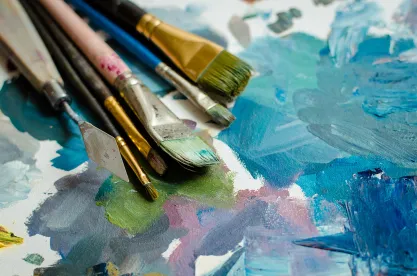Background on Lensa
Artificial Intelligence (AI) is now at our fingertips. No longer a concept hidden behind the walls of Big Tech and academia, AI programs are now available and accessible to everyone. Generative AI tools like ChatGPT have made headlines for its human-like conversation and writing, and Lensa has done the same for its ability to create original works of art.
Originally a photo editing application, Lensa can also generate images using AI. Behind the scenes of this popular smartphone app, Lensa employs Stable Diffusion, an open-source AI model that allows users to create images based on a training dataset comprised of billions of images collected from the internet. The application’s popularity stems in part from the professional-grade quality of the images it generates.
Artists are raising concerns, however, regarding Lensa and generative AI more broadly. Some claim that their art is included in the Stable Diffusion training dataset without their permission. While technically not an act of copyright infringement absent reproduction of a specific image, Stable Diffusion inherently uses other artists’ works when producing new images. Although creators of generative AI models point out that the images that Lensa generates cannot be “described as exact replicas of any particular artwork,” artists have claimed that their styles are being nearly replicated by AI models. Some works generated by Lensa contain discernable remains of artists’ signatures, raising additional concerns of art forgery.
Although artists may be concerned with generative AI’s potential impact on the art world, these issues also raise a broader legal concern: do technologies like Lensa violate copyright laws?
Copyright Implications of Lensa: Fair Use vs. Derivative Works
An AI tool’s ability to create near-replicas of other artists’ works leads to the question of whether AI-generated art be considered derivative of other artworks. The answer is that it depends.
The Copyright Act defines a derivative work as “a work based upon one or more preexisting works, such as a[n] . . . art reproduction . . . . A work consisting of editorial revisions, annotations, elaborations, or other modifications, which, as a whole, represent an original work of authorship, is a ‘derivative work’.” While derivative works are infringements that require the underlying artist’s permission, one needs to be able to recognize the underlying work in the newly-generated work for it constitute a derivative work.
In contrast, merely copying an artist’s style–as opposed to modifying one of his or her works–likely does not qualify as a derivative work.
For example, one may be able to identify several Picasso paintings by their distinctive style, but a newly-created painting in a similar style would not be an infringing work. Similarly, musical works of the same style or genre may sound quite similar to our ears but are not necessarily infringing on one another. Thus, AI-generated artworks–even if trained on a particular artist’s style–likely do not generate derivative works in which any of the artist’s works are recognizable, and therefore would be permissible even absent the artist’s consent.
Even if a Lensa-created image were considered to be a derivative work, the image might still be used without the original artist’s permission if the fair use doctrine applies. Fair use permits unlicensed use of copyrighted works for (among other possible reasons) research and scholarship, which is the stated intention for use of Stable Diffusion and many other AI models. However, the growing commercial nature of generative AI -- Prisma Labs, the company behind Lensa, provides users with 50 unique portraits for a $7.99 service fee -- likely pushes such use beyond the scope of fair use. Moreover, the Andy Warhol Foundation for the Visual Arts, Inc. v. Lynn Goldsmith, et al. case before the US Supreme Court may reshape fair use law in the US, notably how much “transformation” is necessary to make a use “fair”, which some suspect could reverberate to AI-generated art.
Potential Liability under Copyright Laws for AI Model Creators and Users
So, is anyone potentially liable for copyright infringement when Lensa is used? That remains unclear. At least two types of actors are involved: the creators of the Lensa app itself who incorporated the trained AI model, and the users of the app who generate new images based on the trained model. The Copyright Review Board of the US Copyright Office previously ruled that human authorship is necessary for copyright registration and that an AI algorithm itself cannot be an author. However, the US Copyright Office recently granted copyright registration to the human creator of a comic who used AI-generated art; based on statements by the author, the Office seems to have contemplated that there was “substantial human involvement” in the creation of the comic. Therefore, there is some indication that copyright law attributes authorship of AI-generated art to the humans who provided the “input” to the AI model. Here, “input” could include both training of the model and subsequent use of the model by others. This could mean that the creators of products like Lensa that generate potentially infringing works could be liable for copyright infringement by Lensa. It is likewise possible that users who use AI models purposely to generate art that are derivative works of another artist’s work could similarly violate copyright laws.
AI-generated art has made high-quality art accessible to the masses. But it has also made copyright infringement a potential consequence of a few commands given to an AI model. In the absence of further guidance from federal regulators or court rulings, the copyright implications of AI-generated art remain to be seen.






 />i
/>i

